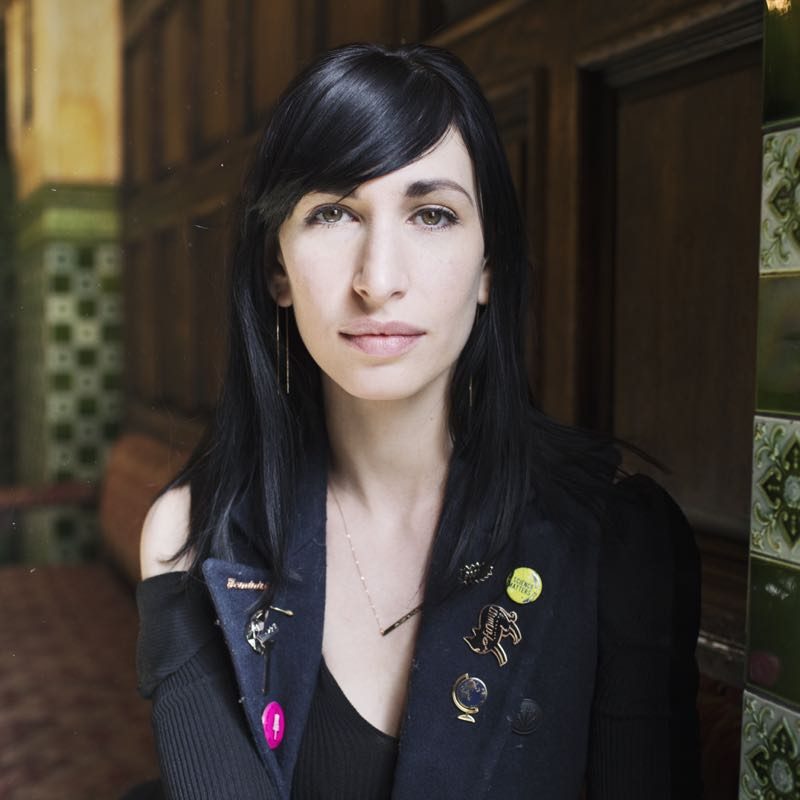An Interview with Nikka Graff Lanzarone
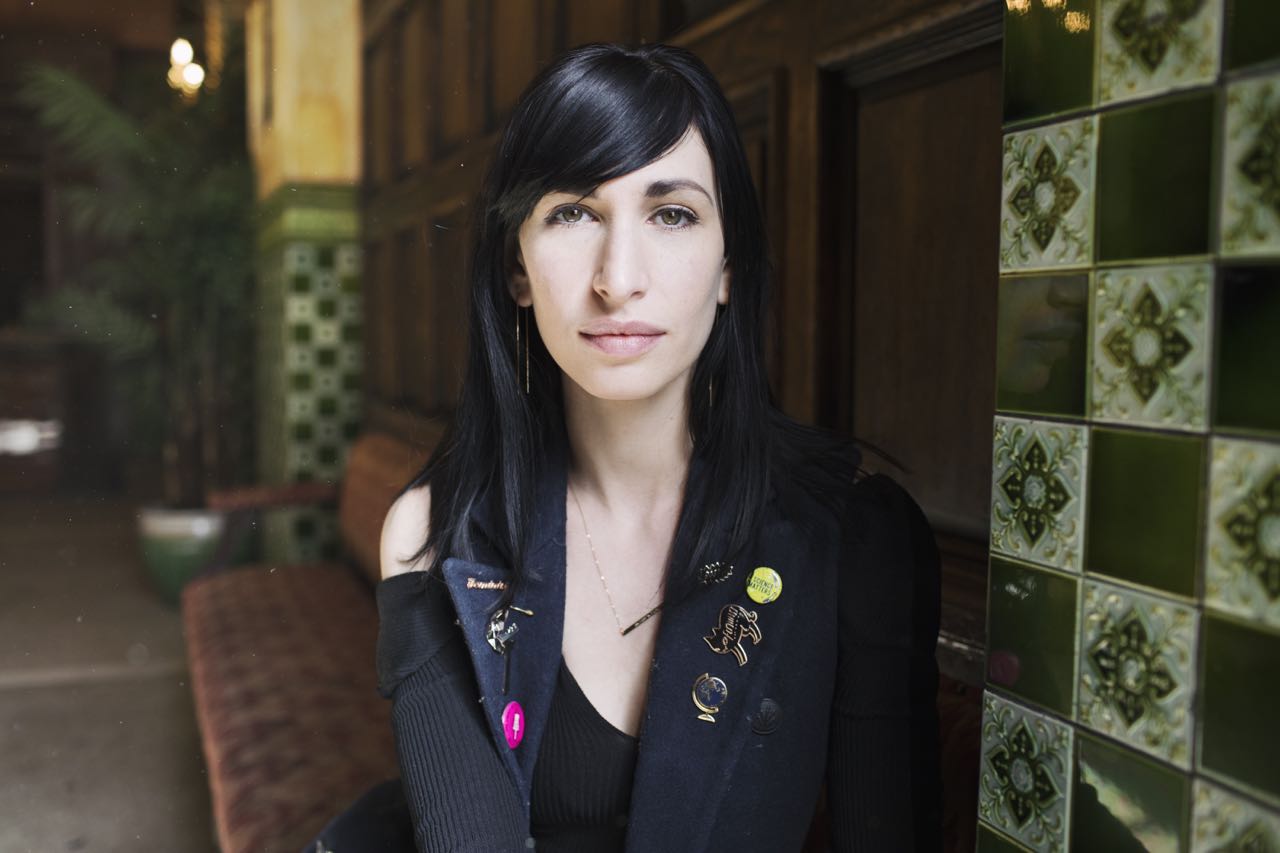
Written by Victoria Myers
Photography by Jacqueline Harriet
February 21st, 2017
On Thursday the 23rd, Nikka Graff Lanzarone is making her solo debut at 54 Below with Hero Worship. For a few months, we’ve been trying to come up with a collaboration between The Interval and The Ensemblist, the podcast that Nikka co-created and co-hosts, but her solo show at 54 Below seemed like a good occasion to sit down and talk to Nikka herself. Nikka brings the same smart and insightful point of view to her stage work as she does to The Ensemblist. Her credits include Women on the Verge of a Nervous Breakdown, Hello Again, Chicago, and most recently, Sweet Charity. We sat down with her to discuss her show, women who have influenced her, how the industry has changed, typecasting, and more.
So let’s talk about your 54 Below show, Hero Worship.
I don’t know where it came from, really. My friend Robbie [Rozelle], who is writing the thing with me and is directing the thing, is a designer and record producer, and sort of this amazing Renaissance man, and he’s gotten this sort of reputation for being the diva whisperer. That’s what they call him. He’s written and directed shows with Melissa Errico, Kate Baldwin, with all of these truly amazing, unbelievable artists. And I think he sees interesting things in people. He sees people the way that they wish they could be seen, and does what he can to bring that out and push it into the world. So he had been after me to write something else for a couple of years, and I was like, “I don’t know,” but I sort of found the hook. Because nothing really makes any sense unless you’ve got a hook.
The hook being the hero worship part.
Right. I had a weird childhood, and grew up an only child in a theatrical family, and so my references and some of the things that are my early childhood context, are sort of strange and bizarre. I’m kind of paying tribute to my family and also all of those people and pieces of art that I’ve loved that shaped me into this person. Whoever she is.
As a kid, were you always looking for things you liked about people or people you wanted to be like?
I feel like we sort of all do that. I think many actors and actor types find great personal safety in getting to play characters and getting to be other people. You get a break from yourself for a couple of hours a day. I think that I would try to pick things that I thought were great about people. There are still things that I want to take from artists. The people I most admire as artists are people who firmly exist in who they are and who aren’t afraid to surround themselves with the best people that they need. Obviously, Beyoncé is the queen of all things, but the thing that I think is so incredible about her is that she is not going to be the person to hire people who don’t dance as well as she does so that she looks better. She wants to rise to the level of her dancers and hires people who are better than her at the thing that they do, in an effort to surround herself with artistic excellence at all times. And I think that that’s really admirable. I realized in making this list of people [who I admire] that firm existence in themselves is a running theme, and is something that I struggle with a lot.
In the show, are most of the people you’re highlighting people who affected you from a certain age or people you admired at all different ages?
The ones that have made the longest lasting impression [on me] all sort of exist in this very young space. So many of those stories are happening between five and eight [years old]. I think the latest we go is somewhere in like 5th or 6th grade. So much of it is tied into my growing up and the media that I would consume growing up and how that affected the kind of artist and person I’m trying to be. It doesn’t go in chronological order. Also, because I’m so generally uncomfortable with performing as myself for any length of time, I’m trying to subvert the cabaret form of, “This is my one woman show.”
Wait, tell me more about the cabaret form.
I mean I’m playing into the cabaret form of songs and stories about you and who you are. Sometimes there will be a show around a theme and sometimes there will be a “journey through my career.” I sort of just want to call attention to the form as it’s happening in an effort to be like, “No, I understand that this is completely ridiculous that anybody would give a shit about me.” I would like for it to be like the Oh, Hello of 54 Below acts. Like you do the thing and then you talk about every single trope that would be there and then turn around and make the thing with every trope. I have not done that. But I would like to at least throw a couple slides in there. Remind us all that we were aware of where we are.
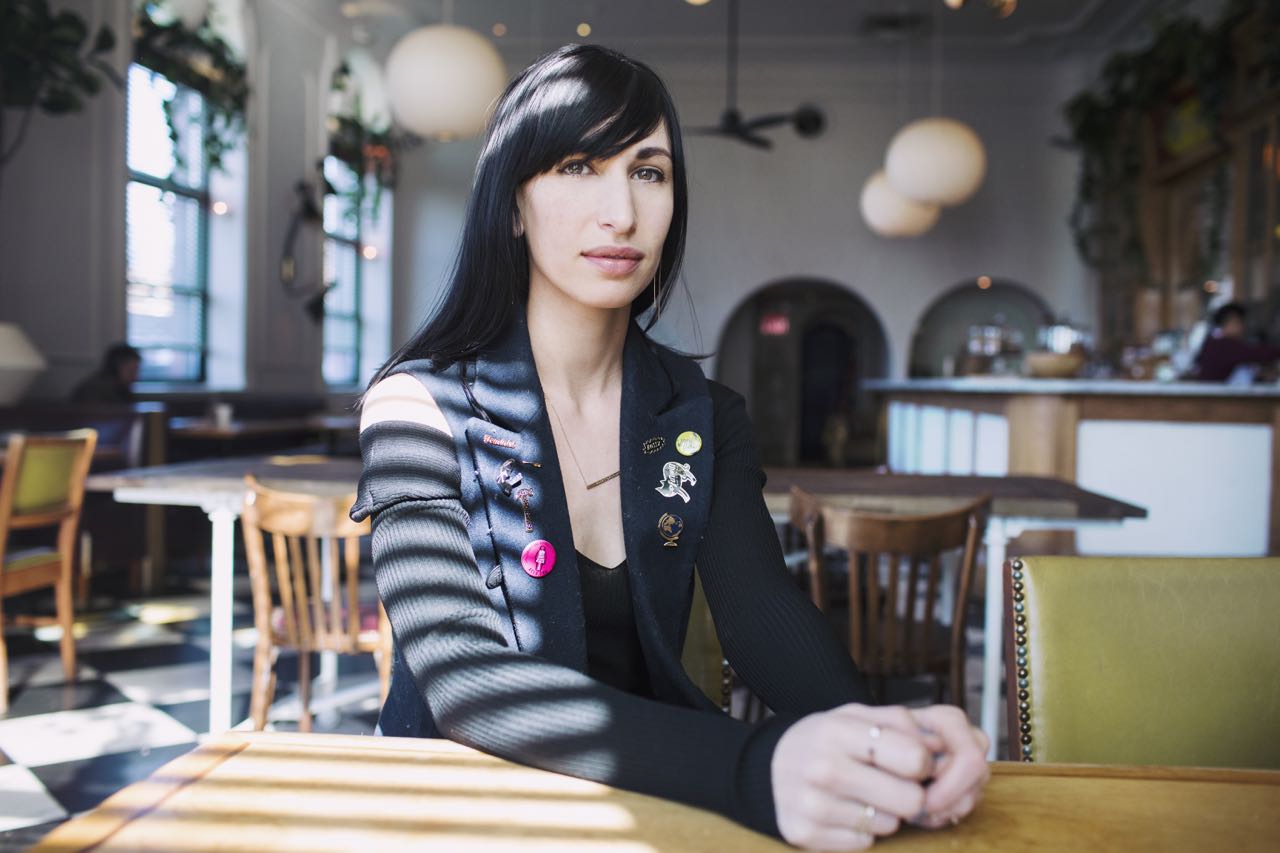
Going back to what we were talking about before, in terms influences growing up, were you interested in who those people were offstage and in private or mostly just as performers?
I think both. And that’s part of the general struggle with celebrity and being fascinated by people. You’re fascinated by the work someone does, so you want to know more about what makes them do the work that they do, the way that they do it. Then there’s the hard thing of when people conflate the person that they are with the character that they’re playing and everything sort of informs everything else. But I generally think if there were a performance or a performer that I would be into, I would want to know more about them. Even if it’s just like, “This is where they studied,” so if these were the footsteps that I’d said I wanted to follow, these were some of the steps that I could ostensibly take to make a clear action plan.
Well, it’s an interesting conversation now too, since there’s so much dialogue in controversial cases about if people should or should not separate the art from the artist.
It’s a weird and difficult conversation because nothing exists in black and white. We as human beings want things to exist in black and white because it’s just easier for us to digest that way. But everything in the world exists in weird shades of gray and it’s hard to divorce a part of you that loved something from before you knew what a shitty person made it. Or a person who became shitty after they started making things. I don’t know if there are any conclusions to come to because also people have different limits for what behavior constitutes “the line.”
How did growing up with your mother, Ilene Graff, and other family members in the business affect your desire to go into the industry and how you viewed the industry?
I think I was raised with a much more practical view of the industry than a lot of people. And for that I am super grateful. The thing that is always more interesting to me are the people where no one in their family knows anything about theatre or about show business, but they decide they want to do it out of nowhere and then do it. That story is far more interesting to me than like, everyone around me did it and I was like, “This seems cool.”
Growing up in it, I learned ridiculous things from such a young age. I learned about organized labor and I learned about collective bargaining and I learned about having to separate your receipts into different envelopes. I learned about managing money well because sometimes you have it and sometimes you don’t. The sort of real life practical applications to life in show business are the things that I got a leg up on. And also, knowledge that nothing is fair and things happen or they don’t, and it could all be over tomorrow, and then you’re glad that you learned how to save your money. So I feel like the real world application shepherded me in a different way.
There were certainly lots of things that I had to figure out on my own because I was in a different generation than the rest of my family. Things were different and things are harder now. And I’m the only person who dances, so that’s a whole different universe that no one knew. Nobody in my family can relate to what that’s like. So that was like my way of trying to set myself apart and to try to earn things knowing that I was doing things on my own because of my skill set and not because of anything else. I think the thing that’s the most important no matter what is that you just have to love it enough to want to keep doing it. No matter how much other stuff you know about show business and how terrible or not terrible it is, the wanting to do it just has to supersede any knowledge.
Let’s talk more about the generational differences, because I haven’t interviewed anyone who has talked about that and has that perspective.
There’s always going to be the one kid that graduates from every program having booked the Broadway show before they graduate. My mom had her first Broadway show immediately upon graduating from school. Everybody in my family had a lot of success in their early 20s and they were able to build upon that. And I didn’t. The requirements for the workload are just so different. Nobody was doing huge chorus musicals with singing choruses and dancing choruses in the ‘70s when my family was starting to work on Broadway, but it still wasn’t a twelve person cast of a giant musical where everyone is required to do absolutely everything. Now, you have to do your entire track, you have to be able to do three other entire tracks. You have to be enough to carry the show, in case you need to. The technical requirements for what you are doing in a show changed. So much music is so much harder to sing now. The requirements for women’s voices, for belting [has gotten much harder and higher]. Back then there weren’t as many, what I call, farm schools. I came out of a farm school, nothing against being farmed out, but the codified education specifically in musical theatre just didn’t exist in the same way.
There are many more BFA programs now and they’re graduating more people than can possibly work in the industry. I think there’s a good argument to be made, for many reasons, for getting rid of BFA programs.
I don’t know if I could have hacked it in any other college situation. I knew that I wanted a degree, and I knew that if I wanted any sort of degree, that was going have to be the degree that I got because I don’t test well. I am the exact model of the student they talk about that falls through the cracks. I don’t think I would have been able to accomplish what I did or didn’t accomplish in college if I had to also take math classes. I do think that learning about a wide variety of subjects and learning about the world at large is the most effective way to be a good storyteller and a good artist, and that’s the thing I have against BFA programs. When you don’t have a larger view of the world, your view of how to tell a story on stage becomes a little myopic. You’re sort of nitpicking at things that in the grand scheme of things don’t really matter. There’s a generation of people who have sort of been chastised for being interested in anything else.
Well, there’s that awful advice they give to 18 year olds in those programs where they’re like…
“If you can picture yourself doing anything… [else, then you should do that and not this].” The most dangerous thing you can say to a child. And I wish that I had known that it was dangerous when people kept beating it into my head over and over again. I wish that I had know that, because I felt afraid to be interested in other things, or learn about other things or have other experiences. Because it was like, “Well, what if this means… [I’m not supposed to be here.]” It doesn’t. It’s your literal job to get on stage and picture yourself doing something else with your life. It can only make you better at your job.
And with everything going on in the world now, institutions should not want to produce a group of people who are scared to read a newspaper and have an opinion about what’s going on.
I’m really curious as to how what’s going on now is going to change this crop of people who will come out because you have no choice but to be engaged. You have no choice. If you think you have a choice, you don’t. You have to. You have to be engaged with what’s happening and you have to know what’s going on. I feel like it’s dangerous and terrifying and really scary at all times, but you want to be able to have a conversation with anybody that you come across.
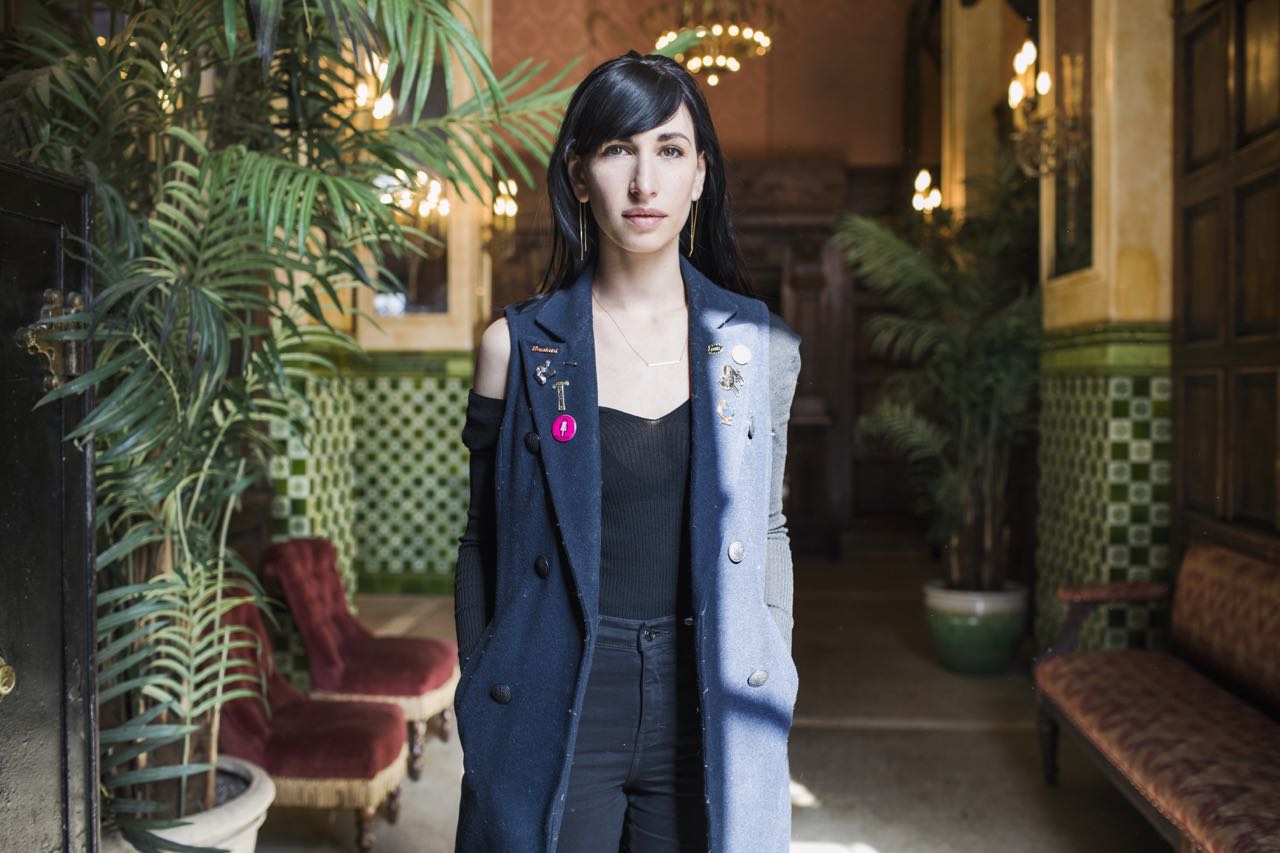
Things people get told in school connects with one of the things that I am always interested to ask actresses, which is how does typecasting and being told what you’re good at and what you’re not good at affect how you develop as a person and performer?
It sucks. The thing I always say about shitty auditions or being cut from something when I was going to like 87,000 open calls a week is, “It’s not you. It’s you.” Divorcing the product from you, the human being, is one of the most difficult things to do as a woman in show business, but it’s so important. And it’s a constant, daily, hourly, to the minute struggle. Some days I’m good at it and some days I’m not good at it. When I go through deep periods of unemployment and I get really freaked out and like, “Oh my god, I’ll never work again,” I know that a lot of the choices that I’ve made in my life where I had the option to blend in a little better, something in me wouldn’t let me. I once had an agent who told me about a really old headshot, “Oh you can’t use that picture, it shows too much of your nose.” It got to the point where I had a post-it on my desk with a list of doctors that people really loved to go get a nose job, but in an effort to do what? Maybe work more? I straddled the line so much of being not quite one thing and not quite the other thing, and I know that. I am not the easiest person to put in a line-up. I know I don’t have the easiest face to get on stage. My joke about myself constantly is that I am a Baker’s Wife [from Into the Woods] trapped in a Witch’s body. The weird comedian part of me that just wants to be weird and funny and make people laugh does not necessarily compute with the person on the outside who looks like she might kill you. But the stuff that I do get to do and the people that I do get to meet who really get me, those experiences might not have happened or might not continue to happen if I had gotten a nose job and decided to dye my hair blonde instead of black. But I struggle with it constantly and there are days I just want to be like, “Ah, fuck it,” and change it all. But there’s something interesting, I think, in being the not quite safe choice. I’m always the, “Oh! Oh yeah! Okay,” choice. Or the person they bring in to contrast the person that they really want to hire, which happens all the time. If one in every X Y Z interesting choices works out, then at least I’ve built a career I can feel good about.
It also seems like musical theatre has very provincial ideas when it comes to physicality. In a way that seems much more antiquated than some other areas, and entrenched in ideas like, “Oh, the soprano are blondes,” and “This is what someone who belts looks like.”
I’m seeing a shift in that over the last few years. Our executive director of Actors’ Equity, Mary McColl, always says that musical theatre is the tail of the dog. It’s the last thing that they’ll change. It’s always the last thing that innovates. It’s the last set of people who feel the economy changing. Theatre, in general, exists just slightly outside of this ever-changing world and, as we change faster and faster, it’s going take that much longer to catch up because there are just so many more moving parts in a musical.
But yeah, it is really frustrating. And I’ve watched so many of my classmates graduate and be sort of devastated that their “types” on the outside didn’t match their insides, and really struggle in forcing themselves into a type. Forcing themselves to pick one or the other and make the rest of them catch up. My best friend, Amy Jo Jackson, has created this unbelievable life and this unbelievable career, and I stand in worship of her constantly because she got out of school and was like, “You know what? Fuck all of this. I’m going to do me.” And has. She is just a beast, and I think it took getting out of that environment and trying so hard to subvert those expectations, and forcing people to look at her as a human being first.
Do you feel like this is another thing that’s harder in your generation than in your mother’s?
Totally. My mom was a hot blonde. There’s never a bad time to be a hot blonde. Since the dawn of time there has never been a bad time to be a hot blonde. Sometimes I have to remind her that, “Not only were you doing a whole lot more in your early career than I was, you also, just by virtue of the way you looked, had a different set of doors open to you than I do.” Just because that is not what I look like. It’s a different and interesting thing to look up to the life and career of someone where I would never have even been able to do those things because people don’t want to buy the same things from me. People just look at me differently than they would have her if we were the same age.
Are there women who you’ve worked with who you feel like you’ve learned a lot from?
Obviously, Leigh. Leigh Silverman is one of those people where I would happily stop a train with my body if it would make her happy. She is one of those rare directors in the center of the Venn diagram who are great directors of shows and are also great directors of actors. The story she is trying to tell is always so clear that everything you do on stage is in service to that story. But she also can make a pretty picture on stage. That’s not a kind of director that you get to work with a lot. She’s such an unbelievable diplomat. I’ve learned so much about how I conduct myself in a rehearsal room from her, and how to get what I want and make everybody feel heard and make everybody feel like their ideas have merit and weight and value. That’s something that serves you in every aspect of your life. Being a diplomat in that way. Being able to manage a lot of different kind of personalities while still going after the thing. And I think she is just such a master of that—it’s a really incredible thing to watch.
Mary Beth Peil is the person I most want to become when I grow up. She has such an incredible body of work behind and in front of her and stacking up on all sides of her at all times. And yet she maintains the most calming presence and she’s the easiest person to be around. She’s the kind of person who, if you just look at her and if you look at her for too long, you’ll start to cry, because she’s such an open vessel of a human being. [It’s like,] “Are you okay if I just sit here on this train with my head on your shoulder and like cry and tell you all my secrets? Is that cool?”
I did a whole two minutes on Amy Jo [earlier] so I would apply that same two minutes on Amy Jo again even though we’ve never really gotten to be in a show together.
I feel similarly about Kathleen Marshall. I like people who remember, above all, that people are people before they are any other kind of thing that they might be, and who approach whatever room they are in with the knowledge that everyone is a human being. That’s sometimes the hardest thing to do, because you have a work list and you want to get shit done. But the people who take the extra four seconds to be like, “You, human being, can I ask you to do this thing,” it creates a kind of room that everyone feels really safe to fail in. The most interesting theatre happens in rooms that everyone feels like, “Well, that didn’t work. Okay,” rather than like, “Oh god, I’m going to be fired because I made a shitty choice in a rehearsal.”
I made a list because you said [we were going to discuss women who inspired me]. And those were people that I wrote down.
Amazing. Let’s go through the rest of your list.
There are a lot of people who created their own TV shows, so there’s a lot of show runners on this list. And Madeline Kahn. I feel like Issa Rae and Amy Sherman-Palladino and Mindy Kaling and Tina [Fey] and Amy [Poehler]. All those people took the things that they did best and created something out of them. And subverted expectations. Insecure is one of the funniest shows on television and I feel like Issa Rae’s voice is a sorely needed voice in this community of funny women. And Samantha Bee, I feel the same way about. I wish that Samantha Bee was [on TV] every day. The fewer fucks a woman gives, I think the most interesting art comes out of that. I wish I had fewer fucks to give. We didn’t talk about Barbara Kruger. We can talk about Barbara Kruger all day. One of my dressing room totems is the “Don’t Be A Jerk” [image]. It goes on my mirror next to my name in every dressing room. Because theatre can be really stressful sometimes, and if we all just remember “Don’t be a jerk,” which means acknowledge the human that’s around you in the story you’re trying to make.
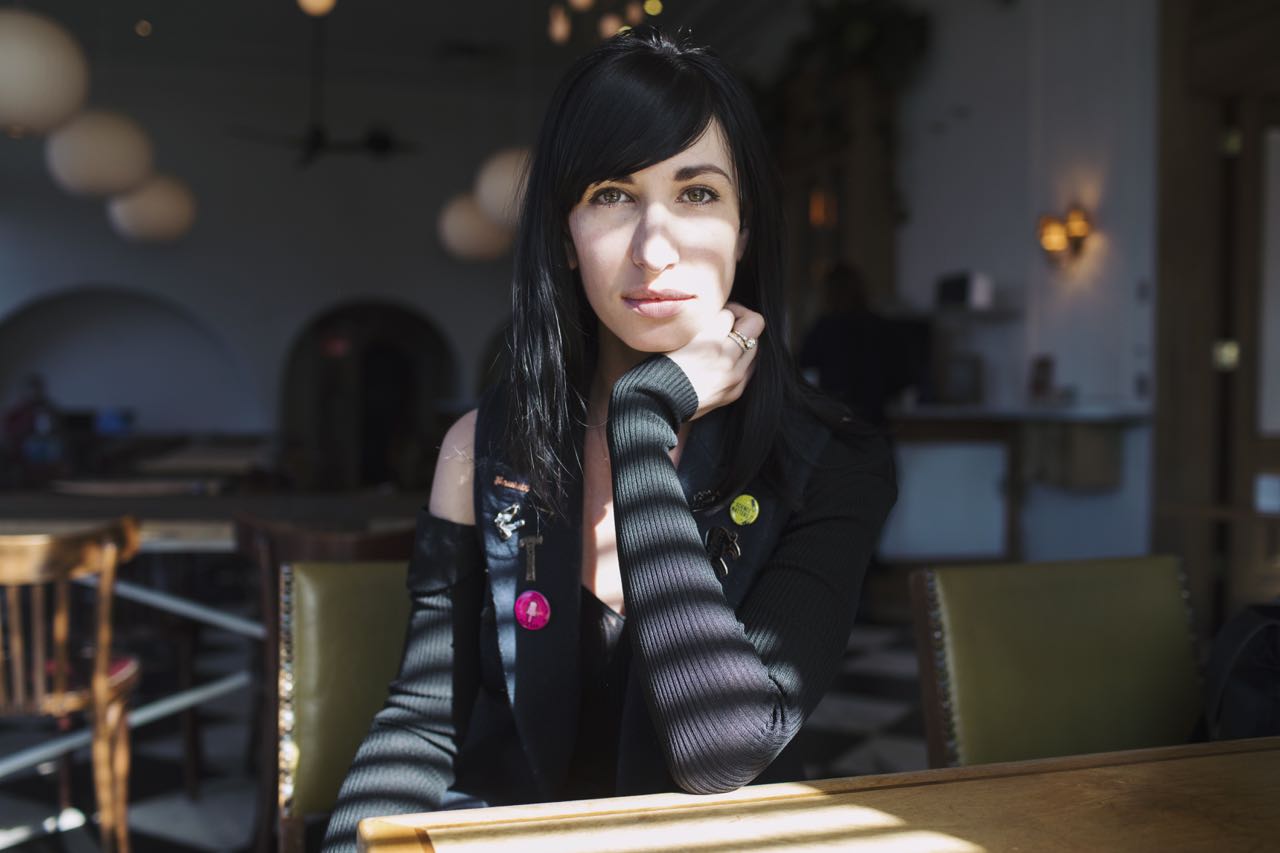
I want to make sure we talk about The Ensemblist, too. What do you have coming up?
The new season starts in March, and the theme is the Broadway community. Every episode will be in service to that theme. So it’s opening nights, and inside dress rehearsals, and the Broadway sports leagues, and Broadway in Bryant Park. You hear so many people talk about “the Broadway community,” and so we’ll break down what the hell that is and why it’s so special and why it’s so interesting. What it is about everyone being crammed into this weird ten square blocks that somehow manages to have its tendrils all over the world. There’s something that’s different about the Broadway community than any other kind of creative community. And everything will be to the larger service of, through the lens of, the ensemble. Just to be like, “Hey there’s a lot of ways to make a career. There’s a lot of ways to make a life in the theatre. And here are some other ones.” Because that’s more interesting to me.
What’s something you think people could do to improve gender equality in theatre?
Writing people as people and subverting the expectations of the “type” issue. Every single person is the star of their own story, which means that every single person goes through the gamut of emotional experiences that we’re trying to get on stage and tell. Which means that every single type of woman is capable of telling those stories, and not just the pretty white, blonde girl. Everyone has their soprano moments and everyone has their big belter moments and everyone their character actor moments. That’s part of being a human and having a human experience. Change the way the gates are kept and think more inclusively from the top down. So much of it we talk about in diverse and inclusive casting and yet, I want to see more casting directors of color and I want to see more of the people who open the gates to be as diverse as the stories we’re getting better at telling on stage. And obviously we can get better and better about everything and should be working more towards that. Largely, artistic directors and casting directors are not people of color, and I think that’s the biggest way to tell the stories we tell on stage is by getting more diverse opinions on all sides of the table.

